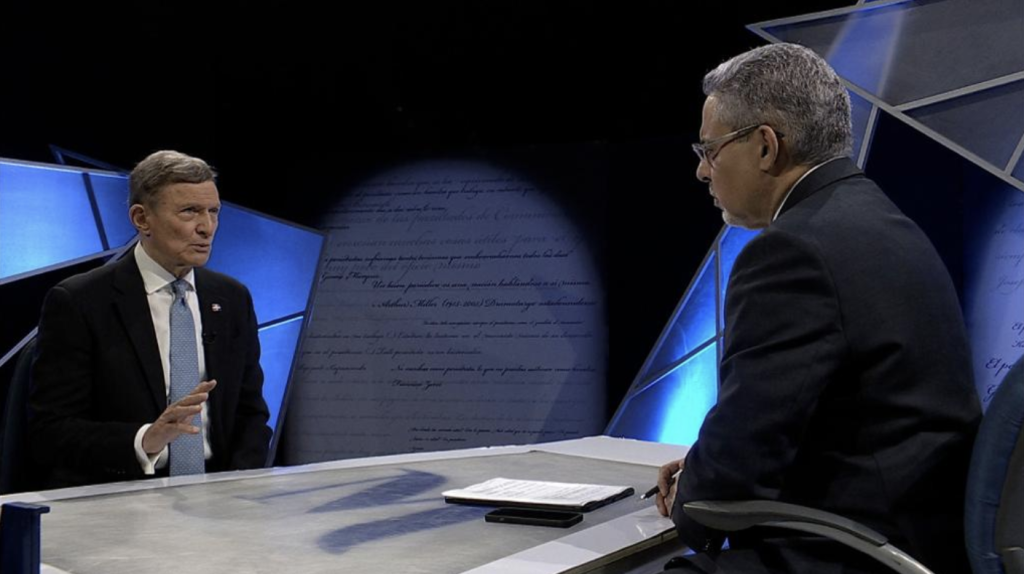
In a TV interview with Pablo McKinney, Foreign Relations Minister Roberto Alvarez explained several of the complexities of dealing with Haiti. He explained that the situation is at a standstill given that the Haitian government in its request to the United Nations has requested a bilateral force not a multilateral intervention to deal with the gangs in Haiti
He explained that the United Nations, for good or bad, respects the sovereignty of countries and is not going to send a multinational force unless the Haitian government so requests this. Alvarez said that the Haitian government has requested a voluntary bilateral intervention.
“The countries willing to send these troops have not shown up,” says McKinney. He pointed to the difficulty in sending the bilateral forces because who will finance, what are the terms of reference, under what type of order, when can they shoot and use force have yet to be defined.
“The capacity of the Haitian government at present is one of survival,” says Alvarez.
He says the Dominican Republic continues to work in the framework of what UN Secretary General Guterres has outlined. Nevertheless, Alvarez is emphatic: “Haiti needs a force of action, fast.” He said the Dominican Republic does not have the keys so that can happen. He says: “We can pressure and do so constantly, but it is a matter of negotiations and we cannot force any country to accept to lead the intervention.”
Alvarez says the request made by the Haitian government to the United Nations means the United States could do so by itself or take leadership of an intervention. “This must happen now,” he said. “We are pressuring, but we do not have a magic wand.”
Alvarez spoke of the major unexpected challenges the government of President Luis Abinader has had to assume since its start in August 2020. First, the Covid-19 pandemic, the Ukraine war and then the assassination of President Moise that he says meant a complete change in bilateral relations. Alvarez said that until July 2021 when Moise was assassinated, the Dominican Republic was working on the grounds of the Joint Declaration signed with that government in January 2021 that addressed the DR-Haiti agenda. Today, he says the situation in Haiti is “chaotic and complex,” with the National Police losing control.
Alvarez explains that the sanctions levied by the recent Resolution 26-53 of the United Nations target the politicians, businesspeople and organizations in Haiti that have helped the gangs grow, more than the gang members themselves. He said the resolution also provides guidelines to develop mechanisms to avoid the contraband of firearms to Haiti.
Alvarez was categoric that the Dominican Republic would not accept to set up refugee camps. He said that the so-called agreement between the United Nations and the Dominican Republic for refugee camps is but “a study carried out during the past government that has no legal force.” He denies it obliges the Dominican Republic in case of an escalating disaster in Haiti to receive Haitians as refugees: “It’s a study and that’s all.”
Alvarez says the issue keeps coming up because “there are sectors that seek to get political gains by saying so.” He said President Luis Abinader has been firm that the country will not accept that refugee camps be set up in the Dominican Republic. “He has repeated this on multiple occasions,” said Alvarez during the interview.
Alvarez reminded listeners of the TV program that during the 9th Summit of the Americas in June 2021 in Los Angeles, the Dominican Republic the Dominican Republic did not sign the declaration of migration to avoid any misinterpretation of unforeseen circumstances.
“We can only protect our border on our side. We do not have the capacity nor the desire to intervene in Haitian affairs. Life in Haiti depends on Haitians. The Haitian elites need to understand that they are on a path that leads to a cliff, and that the elites are already there. “We cannot act beyond our border,” said Alvarez.
In his opinion, the international community has been irresponsible for not being more active in Haiti. “We hope and will continue to pressure for a rapid intervention in Haiti to help the Haitian Police to resolve the critical situation of the gangs. And then move on to efforts to bring jobs so that the young people that join the gangs can find an alternative to survive,” he said.
Alvarez also addressed the challenge of employing an undocumented Haitian workforce in the Dominican Republic. He said this is a decades-long structural problem. He says the Dominican government has offered collaboration to the Haitian government to document its people. But so far, the Haitian government has only documented 70,000 Haitians here.
Read more in Spanish:
Pablo McKinney interview with Roberto Alvarez
El Nuevo Diario
31 October 2022

